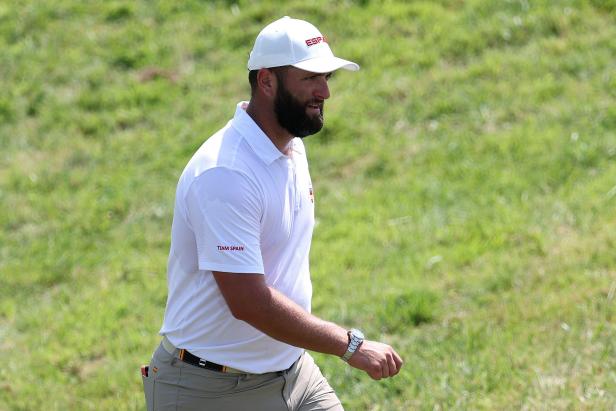SAINT-QUENTIN-EN-YVELINES, France — As golf in the Olympics continues to navigate its way toward relevancy, its latest challenge may be the one that puts it most in line with golf’s major championships. Specifically, like the men’s majors, the Olympics is now wrestling with a qualification process rooted around the semi-fractured Official World Golf Ranking.
With the presence of LIV Golf producing a slight scattering of the best players in the world, the men’s game now finds an Olympic field that, while including the top seven players in the world (according to the OWGR), is missing several notables, including U.S. Open champion Bryson DeChambeau and eight other golfers in the top 20 in the world. The appearance of the top seven in the world would be more than either of the previous men’s competitions. The top four opted out in 2016 citing concerns over the Zika virus, while the top two in 2021 couldn’t play because Dustin Johnson didn’t want to travel to Japan “in the middle of a big stretch of golf for me” and Jon Rahm was forced to withdraw after testing positive for COVID.
It was Rahm who suggested Tuesday at Le Golf National that the qualification process should break from its ties to the Official World Golf Ranking. Rahm, of course, departed the PGA Tour for LIV and its lack of world ranking points early this year. He remains 10th in the world largely because he’s still eligible for the majors. But his ranking already has fallen seven places this year.
“I think you can always do it, like with other sports, and allow the countries to pick themselves,” he said. “There needs to be some guidelines, but like Team USA Basketball is free to choose whoever they want. I understand it's a different circumstance, but I think you need to let each country choose who they want to play.”
As it is, the qualification process is largely removed from the hands of national federations. The field of 60 players is limited to two players per country, or a maximum of four if all of those players are in the top 15 in the world. As it is, only Team USA has four Olympians: Scottie Scheffler (1), Xander Schauffele (2), Wyndham Clark (5) and Collin Morikawa (6), but right now, there are five other U.S. players in the top 15, including Patrick Cantlay (8), DeChambeau (9), Sahith Theegala (11), Russell Henley (13) and Brian Harman (15) who are missing from the Olympic field regardless of where they played.
It's not surprising that fellow LIV golfers Abraham Ancer and Carlos Ortiz agreed with Rahm that the OWGR wasn’t doing them any favors. Ancer, whose OWGR ranking has dropped 300 positions since joining LIV two years ago, even admitted that he chose not to play some Asian Tour events because had he performed poorly in those events it would have hurt his ranking more than not playing.
“I think I was very lucky,” Ancer said. “I was definitely sweating it in the last two months because there was really not much that I could play that fit the schedule to get in the World Ranking points. So I just had to wait and see because it was starting to plummet fast every week.”
Ortiz, as he has been several times over the last year, took a more incendiary tone. His OWGR ranking only moved up this year (more than a thousand spots!) after an Asian Tour victory.
“It's just the situation in golf right now, it's unfair,” Ortiz said. “Especially Olympic Games, you want to have the best golfers right here, but politics somehow manages things still. I still feel there's golfers that should be here and couldn't be here because of what has happened. I think the Olympic Games definitely should be neutral, you know. They should have not turned away ranking players accordingly, especially now that the World Ranking points don't really work anymore.”
Conversely, the sense from other players preparing for the Olympics is that there is no better solution than the OWGR.
“I think that's the nature of qualification for the Olympics, not just in golf,” McIlroy said. “I mean, you could have the fifth-best sprinter in the world but if he's from a certain country, he's not able to make it.”
Indeed, athletes in other sports haven’t made it to the Olympics after a poor performance in what amounts to a one-and-done qualifying process. U.S. pole vaulter KC Lightfoot, holder of the American record, didn’t even make it to the final stage at the U.S. track and field trials, while top sprinter Christian Coleman, the 2019 World Champion, didn’t finish in the top three in qualifying in the 100 meters.
“Like Rory said, you watch other sports, that's the way it is,” said Shane Lowry. “If you don't run the time and don't qualify, you're not in. If they run a bad race, even though they might be one of the best in the world, they are not here competing.”
McIlroy doubled down on LIV golfers decision to choose a tour that was going to cost them World Ranking points.
“I don't think there's any other way to do it because it's hard to compare the golf that they play to the golf that we play,” he said. “So if you want to qualify for the Olympics, you knew what you had to do. Just like if you wanted to qualify for the Ryder Cup, you knew what you had to do. They were very aware of the decision they made when they did.”
For what it's worth, on the women's side, 17 of the top 20 on the Rolex World Ranking will be in Paris.








